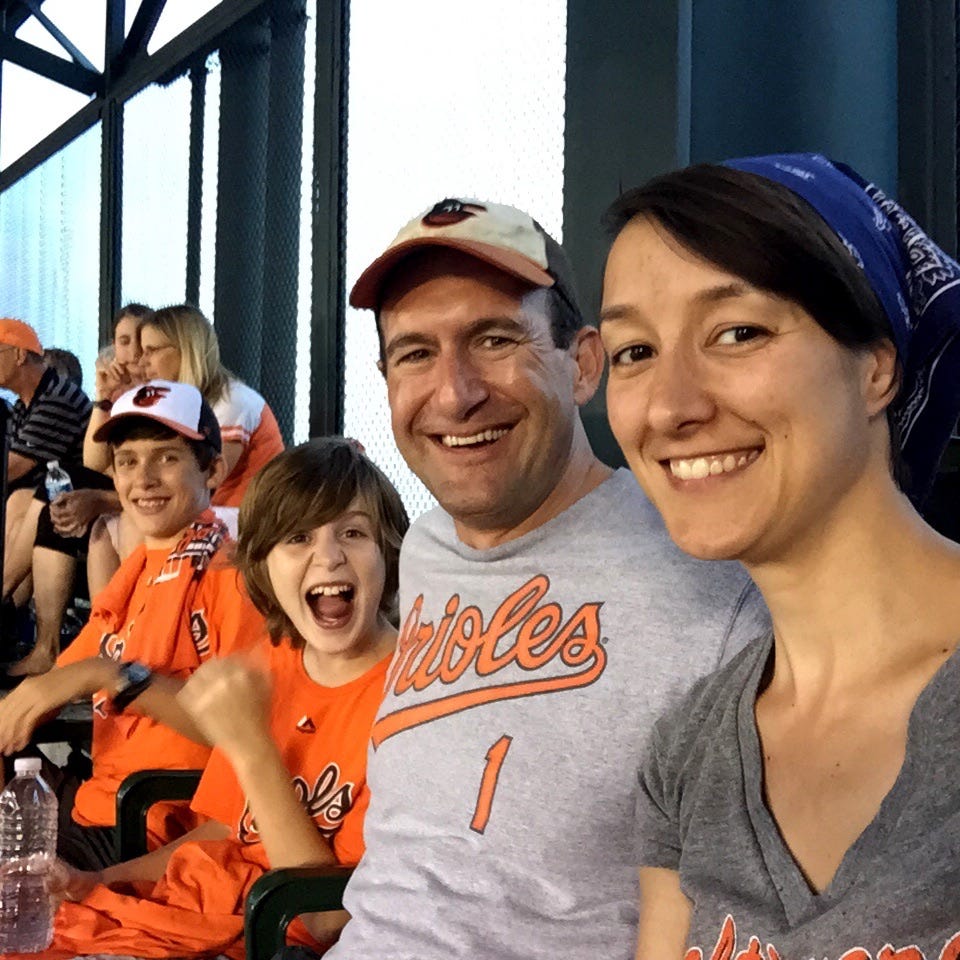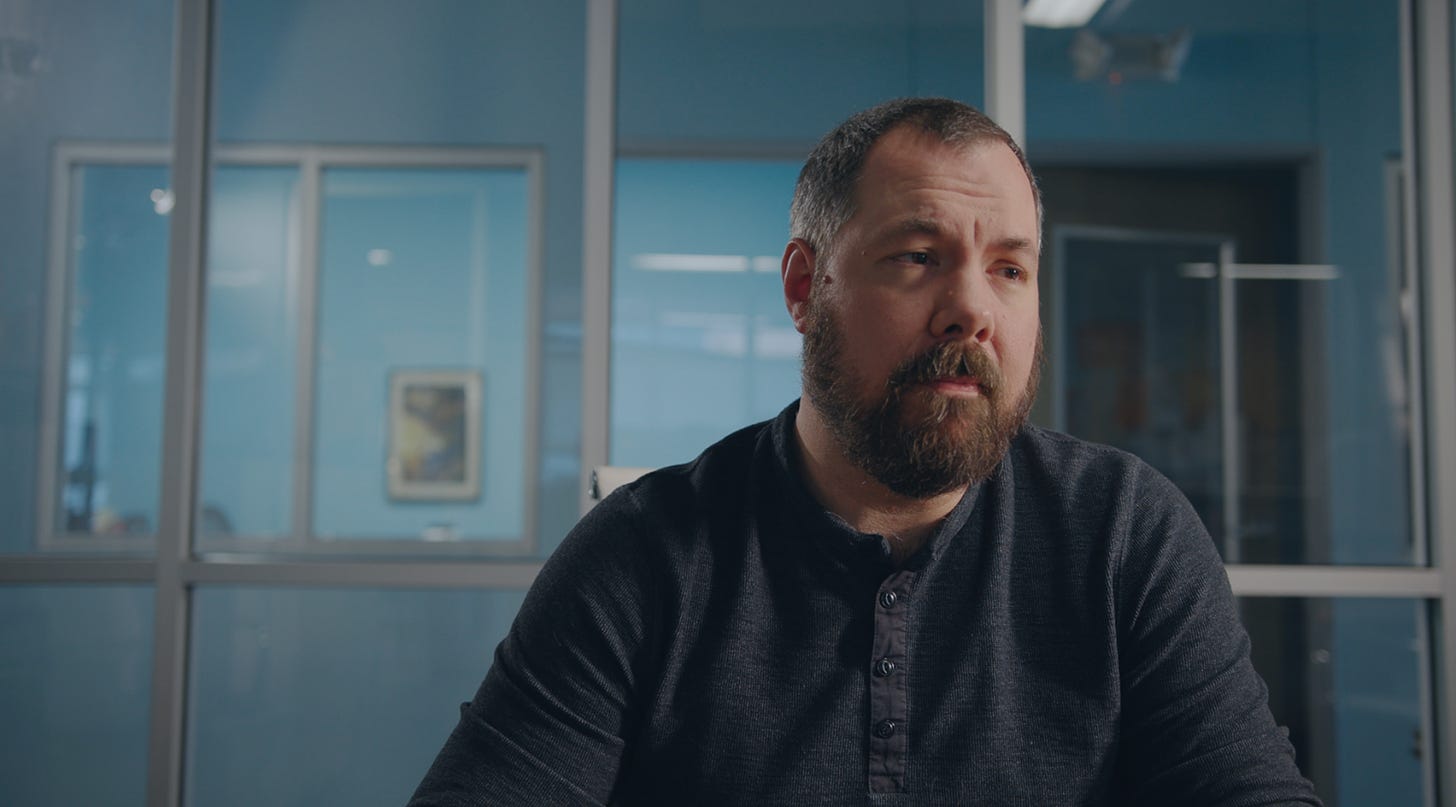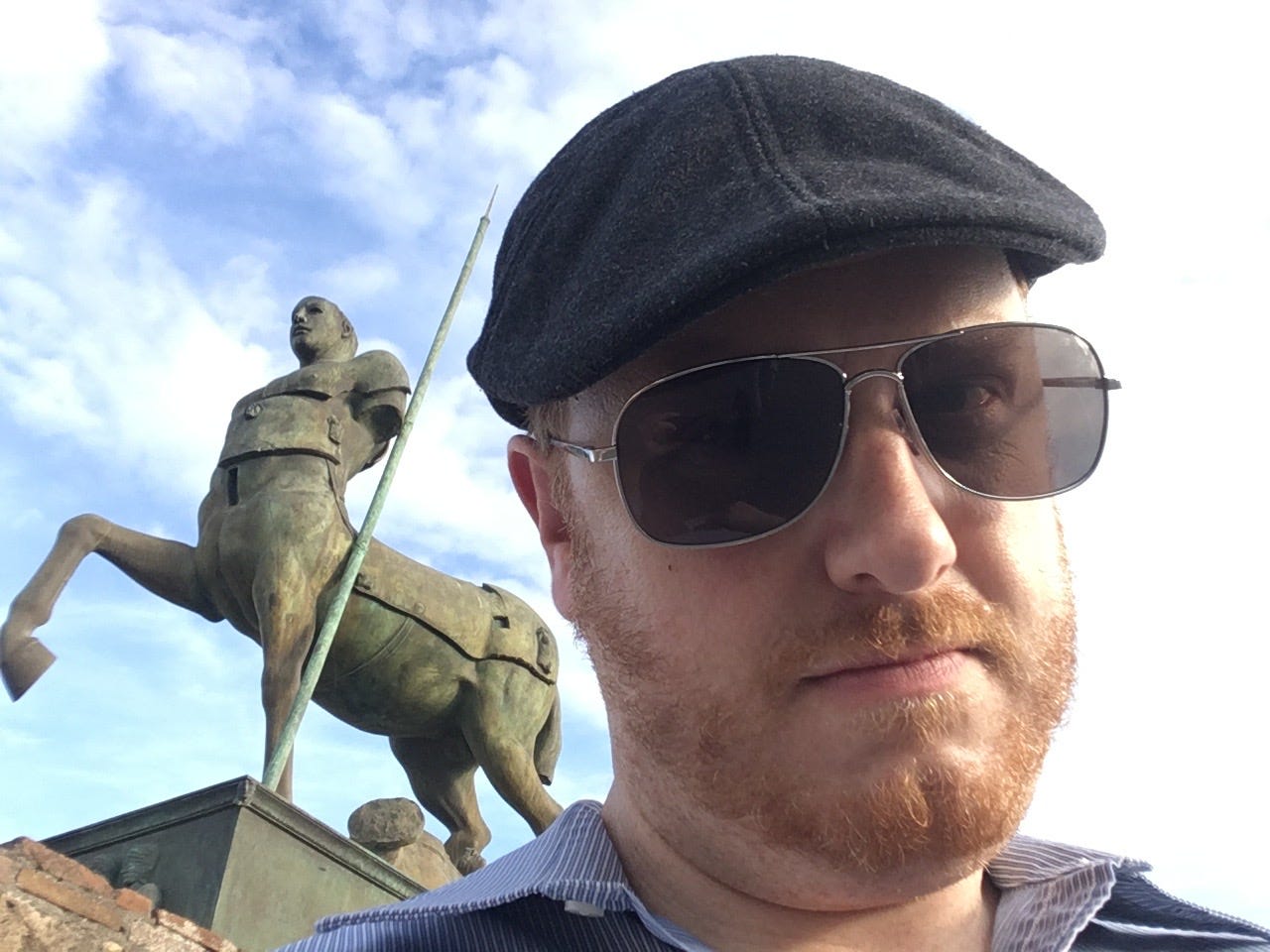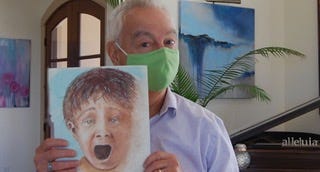This week, I asked Bruce Mehlman where he’d most like to travel. He said, “One hundred years into the future.” Hands down, my favorite answer to anything lately. Well, this week The Experiment features some of my favorite writers and make up half of my dream dinner table. Folks, this is a good one. If this were a print magazine, the oil of your fingerprints would smear the ink on darn near every page.
Let’s start with Josh Berthume, back again with a call to action to prepare for an election day that could take a month. Offering a different dystopian prediction is Frank Spring, who says recasting the role of president won’t remove Trump from the stage. Sit with those awhile. They capture the urgent madness of now and are of a pair. Then we ease in some elixir with longtime Texas journalist and best-selling author Wayne Slater, who tells us stories of how we’ve been here before. And of course we offer a missive from the ‘90s with a chapter from Robin Whetstone’s Red Ticket.
And as always, we remember who we’ve lost and offer recommendations on what to do, read, watch, and listen to. Tiffany Yates offered some advice to writers that has made my way clearer. Maybe it’ll help you. And there’s a video for Fantastic Negrito’s new single that reminded me of Ryan Holiday’s latest post. Trust me, you need to see the video. You will be lifted and set to rights.
But first, did I ever tell you the good news about the Baltimore Orioles?

That picture, obviously, is from the Before Times, five years ago, in fact, when I achieved a life goal of owning season tickets to the Baltimore Orioles. This is my family. From left are Henry, who finished his first year of college in his bedroom, Hatcher, who doesn’t know when school is starting, much less whether he will have to attend in person or online when it does, me, and my wife Sonia, the political consultant in the family who rises daily, surveys the hellscape that is our democracy, and sets herself to work of fixing it.
Until recently there were no ballgames, which frankly was a relief for me. I am, obviously and notably, a fan of the Baltimore Orioles. They went to the World Series the year I fell in love with them. There was another championship a few years later, and then a long, fallow period of misery so bleak it affected my self image. Let’s just say that being a Texas Democrat during their current losing streak felt completely normal. Then, around the time that photograph was taken, the Orioles were good again, all of a sudden, and to much delight. And then, in the middle of 2017, all of a sudden, despite having a roster full of good players, they became the worst team in baseball. There was a fire sale — the team traded all of the accomplished players for young prospects who might be good in a few years — and for the last two years, nothing but misery. I stopped watching baseball. There was no joy in Mudville.
Then the pandemic stopped everything, Spring Training included, and there was talk of cancelling the entire season. This speculation occasioned many expressions of relief, because if the Orioles were the worst show on turf for the previous two years, 2020 promised to be even worse. Their best player got stage 3 colon cancer. Their highest-paid player was coming off, statistically speaking, the worst season in the history of baseball. Baltimore’s roster was so full of failed prospects, journeymen, and recycled castoffs that “claimed off waivers” could have served as the team’s motto. This season was going to be bad on a planetary scale.
And then it happened. They figured out how to do a 60-game schedule, down from the usual 162, with no fans in the stands. They rejiggered Spring Training to limit exposure. All practice games became intrasquad games, necessitating ghost fielders, just like when we were growing up and didn’t have enough kids to field two complete sides. They change the rules; each game in a doubleheader would be seven innings, not nine, and in extra innings everyone would start with a runner on second, making it easier to end the damn game.
For a while, I felt angry they were even trying to have a season. The only way to defeat the pandemic is to shut things down, and baseball, for all the joy it can bring me, is not an essential activity. Honestly, I didn’t mind the cynicism. Our economy just survived, if that’s even the right word, its worst quarter since the 1800’s. Every sixth American has used a food bank recently. A third of the country is late on rent or mortgage. More than a million people a week have filed for unemployment for so long that it was big news when only nine hundred or so thousand did. I don’t begrudge anyone their commerce.
But when we’re all being told to stay home, starting an inning with a runner on second to limit the spread of infections seemed like a lie adults tell children. I remember once, when I was young and our family was so broke we used plastic bread bags for lunch sacks because brown paper bags were an extravagance, my mother’s second husband came home with a big camper trailer. Being told that having a baseball season during a pandemic reminded me of how it felt looking at that damn camper trailer while he told me this was a good idea because we wouldn’t have to stay in hotels anymore. We never stayed in hotels. When we visited family, we slept in guest rooms. Our only vacations were camping trips when we slept in tents. I felt like baseball was asking me to accept a camper trailer-sized lie.
It all seemed forced and fake, not to mention, given the coronavirus’ lack of concern with our way of life, unwise. Outbreaks of infections for the Miami Marlins and St. Louis Cardinals forced cancellations. The schedule became a rough draft and COVID its editor, capriciously crossing out entire series with its red pen, reordering entire paragraphs of road trips. Everyone kinda figured the season was about to be cancelled, and it may well yet be.
But if they do cancel the season, I will still have my memories, because before they lost last night, the Orioles had not lost for more than a week. Sports Illustrated predicted they would be lucky to win 10 games in a 60-game season, a total they reached after playing only 17. They are winning with a worse roster than last year when they stunk up the summer like a tire fire. I used to get cruel texts from friends, mocking my team’s comic ineptitude. I still get texts, but now they are puzzled that their team, invariably blessed with a roster full of star players, is losing to a bunch of nobodies wearing Orioles jerseys.
The game has adapted. Broadcasters pipe in canned crowd noise when someone gets a hit. You know it’s fake, but it beats the silence of an empty stadium. And because of the changes necessitated by baseball’s attempt to play a team sport without, you know, killing everyone involved, they’ve achieved a lot of weird firsts: the first leadoff, two-run inside-the-park home run, the first leadoff double play, and the first socially-distant celebration at the end of a game.
Still, I felt like I was complicit in prolonging the pandemic, no different in spirit than people scorned on social media for partying in public. Honestly, I felt the same way about football, another professional sport that wasn’t placing itself under a protective bubble, hoping for the best. It wasn’t until the football player was thrown off his team for trying to sneak a girl into the players’ dorm by dressing her up in team gear in hopes of passing her off as another player that I realized why baseball, and as it turns out football, too, are different.
"Clear message on the responsibility everyone has in the NFL’s COVID-19 world: Put the team at risk, suffer the consequences," tweeted a sportswriter.
We’re all out here, rationalizing a socially distant visit to a friend’s pool, eating outside and trusting the waiter’s mask and the restaurant’s fan to make interacting with other people safe. And because our country never got a handle on testing or contact tracing, an asymptomatic carrier will likely never know if he or she caused a friend of a friend of a friend to get sick.
But in baseball and football, every player is accountable to the whole team. Every player knows that what they do off the field can prevent his team from ever getting onto the field. Screw up, and the game gets cancelled. “One person can mess up 20 people and then you don’t have enough people to fill a roster on game day,” said a quarterback for the Washington Voldemorts.
“You definitely have to police yourself,” Washington tackle Morgan Moses said.
“We’re all in it together” Fuller said.
There. That’s it. Football players for a team with a mascot so racist they don’t even say the name out loud anymore just articulated a coherent posture toward the coronavirus. There is no getting back to normal, just a jangly uncertainty with no end in sight. If we are to do anything that involves other people, such as going to school, seeing a show, or taking the family to a ballgame, we’re going to have to stop thinking of it in terms of “other people.” There is only us. There is no them. Like those football players said, we are all in this together, so you have to police yourself.
We have to adapt in real time. Maybe starting an inning with a runner on second will help. Maybe making kids wear masks and face shields and face the wall will work. The choice we’ve been given in the United States — shut it all down or open it up and deal with it — only guarantees either crushing economic pain, hunger, homelessness, and poverty, or a death toll that resembles genocide. Right now, because our asymmetrical failure to govern ourselves has politicized epidemiology, we’re getting a lot of each. We are the casualties of this cold civil war.
Our job is to live during wartime while knowing that our choices affect everyone’s chances of survival. Life goes on not in spite of but because of our adaptations. Hatcher and I are taking Henry back to college on Monday. He’s rented an apartment with a friend from high school just so he can attend an organic chemistry lab in person and take the rest of his classes online. In truth, he just wants a life bigger than his bedroom, and despite all the parental reflexes wanting to keep him there, I want him to have a life, too.
After we drop him off, Hatcher and I are going to keep driving. The boisterous one sitting next to me doesn’t know when school is starting, so we’re going to socially distance ourselves all over Texas. I’ve always wanted to see the Palo Duro Canyon and the Cadillac Ranch, but what I’m really looking forward to is sitting next to him for hours, talking with him about podcasts and music, listening to whatever he wants to say while we look at that big sky over the West Texas horizon. All that blue filling up a windshield almost makes a guy feel like there are better days ahead if you just keep gas in the tank.
We Know How This Ends
by Josh Berthume
In June, Josh Berthume wrote about his prescient and dystopian nightmare, “7 Hours in November,” about how a delay in calling the election could leave us vulnerable to disinformation and lead to chaos. Events in July and August only confirmed his worries. Now he’s back with a call to action: It’s time to prepare for an election that stretches into December.

This is troubling because it is unusual, and like so many objectively grim realities facing us, it isn’t obvious. It is hard to imagine.
Neither Gone Nor Forgotten
by Frank Spring

Frank Spring, one of my favorite writers and dearest friends, was the first person I turned to when I needed people to guest host this newsletter while I was busy with a book project. He is singular. Now he’s working on his own book while adjusting to fatherhood, which is like learning a new language while traveling to the moon outside the rocket. Still, he was kind of enough to write us a letter about the ungracious future that awaits us. Never will you have as much fun reading about something so horrible.
Trump is likely to lose this election, and he’ll leave office. But, to our collective horror and dismay, he just won’t go away.
We've been here before
by Wayne Slater

My old friend Wayne Slater, is the former senior political writer for The Dallas Morning News and co-author of Bush’s Brain: How Karl Rove Made George W. Bush Presidential. He now lives in a vineyard in Florence, a small town north of Austin.
I mentioned to Bush that the ex-governor was in the crowd.
“Really?” Bush asked. “Why didn’t he come up on the stage?”
“Prison, you know,” I said.
Red Ticket: The Sadistic Couplets
by Robin Whetstone
Every weekend we serialize Red Ticket, Robin Whetstone’s memoir of her time in Moscow in the early ‘90s. In this chapter, Robin, in order to get Russian boys to recite schoolyard poems, fakes a marriage to sell pins to Americans.

The woman jerked her head back in surprise. “You’re an American!” she said. “What are you doing here?”
I knew that “trying to write an article about the Sadistic Couplets” would only confuse her, so I put my hand on the shoulder of Shaun Cassidy, who had stopped singing, and said, “I’m selling pins with my Russian husband to try to help finance his singing career. He is a musician, you see. And also an artist. Yes, he made these pins.”
RIP
How we’re getting through this
Getting horoscope read
Paying off household debt
Paying off credit card debt
Resurrecting extinct rhinos
Watching live sports for free
Posing with architecture, artfully
Staging multi-sensory virtual events
Resetting stress levels in five minutes
Going to food banks in record numbers
Making roasted chicken with peaches, basil and ginger
Reissuing works by women reissued under their real names
Never wearing neck gaiters again because they’re literally worse than nothing
What I’m reading
Taylor Goldestein: “Texas Rep. Poncho Nevárez reflects on 292 sober days since cocaine arrest”
HBR: “Microsoft Analyzed Data on its Newly Remote Workforce”
While weekly meeting time increased by 10% overall — we could no longer catch up in hallways or by the coffee machine, so we were scheduling more connections — individual meetings actually shrank in duration. We had 22% more meetings of 30 minutes or less and 11% fewer meetings of more than one hour.
Ryan Holiday: “9 Short Quotes That Changed My Life and Why”
Jezebel: “My Dark Journey Into the Soul of a Model Young Republican Candidate”
Charles Pierce: “If the Republican Party Get Wiped Out in November, It's Going to Lose What's Left of Its Mind”
I hope I’m wrong, but I don't think that the Republican response to a thumping Trump-inflicted wipeout in November is going to be a Kasichian return to simple Reaganaut extremism. I think that, driven by the base it has worked so hard to create, the party is going to respond by losing what little is left of its mind.
Ross Ramsey: “The election won’t humble the coronavirus. It’s the other way around.”
We wanted haircuts. Now we want football. The coronavirus doesn’t care.
Tiffany Yates: “On writing like an editor--and how bestsellers revise”
What I’m watching
A bunch of talented people saying nice things about Eugene Levy was the nicest and occasionally funniest thing I’ve seen in a long time.
The second season of The Umbrella Academy, which imagined 1963 Dallas in which JFK’s assassination was not the worst thing possible, was a fun diversion and surprisingly emotional, though I’ll be honest, it doesn’t take much these days for me.
What I’m listening to
Been thinking a lot about time lately. Ryan Holiday, Austin’s stoic philosopher in residence, writes a lot about time, and did again in Friday.
Seneca writes that we think life is short, when in reality we just waste it. The present moment—it is the most valuable thing you own. It is the only thing you have. Don’t waste it. Seize it. Live it. In this article, we list some of the time techniques Seneca used to make the most of his time. Meditate on them. Come back to them often. But most importantly, apply them
Time is not simply a unit of temporal measure but of capacity. Whether you leave it empty or fill it up, and with what, is up to you. That is the animating concept behind the video for Fantastic Negrito’s danceable, marvelous Chocolate Samurai. Oh my people, enjoy this song, and I hope you are filling your time with good stuff.
What do you think of today's email? I'd love to hear your thoughts, questions and feedback. I might even put ‘em in the newsletter if I don’t steal it outright.
Enjoying this newsletter? Forward to a friend! They can sign up here. Unless of course you were forwarded this email, in which case you should…
Want a way to send gifts and support local restaurants? Goldbelly’s got you hooked up.
I used this to order scotch delivered right to my door. Recommend.
Thanks to Noom I am down to my college weight, and haven’t had to cut out any foods. I hit my goal weight in May and have stayed within a few pounds either way ever since. This is easy. Noom is an app that uses psychology, calorie counting, and measuring activity to change your behavior and the way you think about food. I’m stronger and healthier than I’ve been in years. Click on the blue box to get 20% off.
Want a way to send gifts and support local restaurants? Goldbelly’s got you hooked up.
I now offer personal career coaching sessions through Need Hop.
If this newsletter is of some value to you, consider donating. Honestly, I’m not doing this for the money. I’m writing this newsletter for myself, and for you. And a lot of you are contributing with letters and by suggesting articles for me to post. But some of you have asked for a way to donate money, so I’m posting my Venmo and PayPal information here. I promise to waste every cent you give me on having fun, because writing this newsletter for you is some of the most fun I’ve had. Venmo me at @Jason-Stanford-1, or use this PayPal link.




All info about NBA, Basketball bilasport.info
How to watch NBA Basketball live stream, today/tonight & Find NBA schedule, score, news update.
https://watchnba-live.blogspot.com/